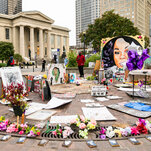The judge’s order allowing the extension was not immediately available on the Kentucky courts website on Wednesday. Stew Mathews, a lawyer representing Mr. Hankison, confirmed the attorney
In theory, grand jurors have broad powers to investigate cases, including the ability to subpoena witnesses, but in practice, prosecutors control the process — determining how much evidence is presented and which charges the jurors should consider — and are rarely challenged. For example, grand juries do not need to limit themselves to the charges presented by a prosecutor, but many may not realize that. Much of what a grand jury understands about its role comes from the prosecutor.
In an interview with Louisville television station WDRB on Tuesday, Mr. Cameron was asked if he had recommended any charges against the two officers — Sgt. Jonathan Mattingly and Detective Myles Cosgrove — who shot Ms. Taylor, and would say only that he had not pushed for any murder charges.
“If they wanted to make an assessment about different charges, they could have done that,” Mr. Cameron said of the grand jurors. “But our recommendation was that Mattingly and Cosgrove were justified in their acts and their conduct.”
To bring an indictment, grand jurors must find probable cause, a much lower standard than that used to determine guilt or innocence. In Kentucky, nine of a grand jury’s 12 members must vote to bring charges in order for someone to be indicted.

Grand jury proceedings usually remain hidden, but in rare instances, records from deliberations have been released. After a grand jury declined to indict Darren Wilson, the police officer who killed Michael Brown in Ferguson, Mo., in 2014, the prosecutor released thousands of pages of transcripts and evidence.
The Kentucky court has not yet ruled on whether the juror who filed the court motion would be allowed to speak publicly, but Mr. Cameron said he had “no concerns” with jurors describing the deliberations.
Will Wright reported from Louisville, and Nicholas Bogel-Burroughs from New York.





